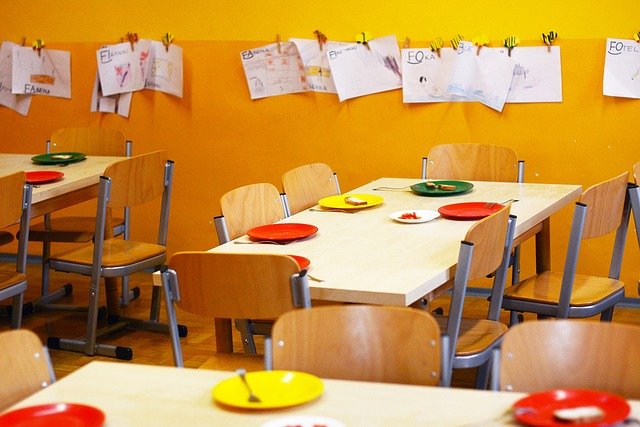Plant-based school meals are an essential part of the solution to the environmental and climate urgencies, because they consume less water and produce less greenhouse gases than meals with animal proteins, while being (at least) as nutritious.

1. What is the problem?
- Animal agriculture and fishing industries are major contributors to environmental problems.
Scientific evidence show that the animal farming and fishing contribute massively to the climatic and ecological emergencies (1, 2). Animal agriculture emits 18% of the world’s greenhouse gas (3). It also causes deforestation, since the Amazon rainforest is cut down for soy crops that will feed Western’s cows (1, 4, 5). Fishing has depleted numerous aquatic animal populations, with unprecedented decrease in the number of fish (6). Animal agriculture and fishing industries are major causes of ocean acidification, which disrupts corals and other aquatic animals (1). They also have a dramatic impact on water quality, with pesticides and tons of feces infiltrating into water supplies as well as the ocean and threatening the health of the organisms that depend on those ecosystems (1,7,8).
In a nutshell, the current food system is unfit and unsustainable (9).
- We can address the environmental emergency to give children a more hopeful future.
Children grow up in a climate crisis and many develop eco-anxiety (10). Being too young to take all possible actions, primary school pupils can feel powerless in the face of the emergency. Depression can grow quickly in this situation. Since animal proteins impact astonishingly the environment, children can feel the dissonance between the discourse at school to take individual steps to reduce our carbon footprint, and the animal products served daily at the canteen.

2. The solution is under our eyes
- Plant-based food systems are better for the environment
Systematic scientific reviews of the impact of dietary change suggest that a plant-based diet is the most sustainable nutrition to mitigate the ecological disaster (9, 11, 12, 13). Switching to a fully plant-based food system would reduce food’s land use by 76%, food’s greenhouse gas emissions, acidification and eutrophication by 49%, using 2010 as a reference year (4).
We now have scientific evidence that well-planned plant-based diets are nutritionally adequate (14, 15, 16, 17). We can grow well and get all essential nutrients from plants, except vitamin B12, which is easily supplemented (14, 16, 17); vitamin B12 is easily found in fortified food such as breakfast cereals, nutritional yeast and non-dairy milk.
It’s not a hard nut to crack that now is the time to switch to healthy and sustainable plant-based food systems (18).
- Plant-based school meals is the next step
Plant-based school meals are a low hanging fruit, ideal and needed to tackle climate change.
In England, an analysis of over 6000 meals in schools showed that over half the carbon emission and 38% of the water footprint are due to meat and fish (19). An analysis of school meals found that plant-based meals not only had the lowest environmental impact but also the highest energy value and best nutritional value (20). Serving low carbon plant-based meals has the potential to reduce the environmental footprint of the canteen by 46-60% (20). All plant-based milk are more environmentally friendly than cow milk (4). Besides, children with lactose allergies or intolerances will no longer be left with a different meal.
A transition to plant-based school meals will bear fruits for our environment. Taking collective action by providing pupils with plant-based food will show consistent commitment to help solve the climate emergency, making it easier for young people to adopt climate friendly practices from a young age.
3. We are already moving forward

Some are already adapting and moving forward with sustainable diets. In 2017, German environment minister paved the way to sustainable vegetarian meals within her organisation (21). Following the recognition that meat and fish are not necessary at any stages of life (14, 15, 16), some nurseries in the UK are also choosing to offer vegan or vegetarian meals (22). Meat-free mondays are very popular.
After declaring a climate emergency, Enfield council has stopped serving meat at its council events and Lewisham council has voted to provide exclusively plant-based options at theirs. Leeds City Council has decided to introduce more meat-free meal options in their 182 primary schools. In France, Lyon will serve all meals meat-free to its 29,000 children (23).
Growing legumes in the UK can provide nutritious and local plant-based proteins. Dishes from around the world use beans and peas can inspire the cooks. A couscous or a falafel with hummus are for instance easy and tasty additions to the school menu. We are lucky that in the recent years plant-based protein meals have increased in quality and diversity. Ever dreamed of nuggets made of sustainable pea protein that taste even better than the original meat ones? Yes, this is where we are. It’s a piece of cake, but it needs all of us.

With your help, we can achieve huge goals for animals, people, and the planet. Find out how you can be part of this incredible journey by learning more about the campaign here and there. Sign up here to find out how you can get involved and get support. You can also register your interest to get updates on the campaign.
References:
1. Intergovernmental Panel on Climate Change (2014). Climate Change 2014: Mitigation of Climate Change. Contribution of Working Group III to the Fifth Assessment Report of the Intergovernmental Panel on Climate Change [Edenhofer, O., R. Pichs-Madruga, Y. Sokona, E. Farahani, S. Kadner, K. Seyboth, A. Adler, I. Baum, S. Brunner, P. Eickemeier, B. Kriemann, J. Savolainen, S. Schlömer, C. von Stechow, T. Zwickel and J.C. Minx (eds.)]. Cambridge University Press, Cambridge, United Kingdom and New York, NY, USA.
2. Myers, R. A., & Worm, B. (2003). Rapid worldwide depletion of predatory fish communities. Nature, 423(6937), 280.
3. Steinfeld, H., Gerber, P., Wassenaar, T. D., Castel, V., Rosales, M., Rosales, M., & de Haan, C. (2006). Livestock’s long shadow: environmental issues and options. Food & Agriculture Organisation.
4. Poore, J., & Nemecek, T. (2018). Reducing food’s environmental impacts through producers and consumers. Science, 360(6392), 987-992.
5. Margulis, Sergio. (2004). Causes of Deforestation of the Brazilian Amazon. World Bank Working Paper;No. 22. Washington, DC: World Bank.
6. Hutchings, J. A., & Reynolds, J. D. (2004). Marine fish population collapses: consequences for recovery and extinction risk. BioScience, 54(4), 297-309.
7. Vizzini, S., Martínez-Crego, B., Andolina, C., Massa-Gallucci, A., Connell, S. D., & Gambi, M. C. (2017). Ocean acidification as a driver of community simplification via the collapse of higher-order and rise of lower-order consumers. Scientific reports, 7(1), 1-10.
8. Cattano, C., Claudet, J., Domenici, P., & Milazzo, M. (2018). Living in a high CO2 world: a global meta‐analysis shows multiple trait‐mediated fish responses to ocean acidification. Ecological Monographs, 88(3), 320-335.
9. EAT-Lancet Commission (2019). Healthy Diets From Sustainable Food Systems summary report.
10. Wu, J., Snell, G., & Samji, H. (2020). Climate anxiety in young people: a call to action. The Lancet Planetary Health, 4(10), e435-e436.
11. Hallström, E., Carlsson-Kanyama, A. & Börjesson, P. (2015). Environmental impact of dietary change: a systematic review. Journal of Cleaner Production, 91, 1-11.
12. Springmann, Marco (2016). Going veggie would cut global food emissions by two thirds and save millions of lives – new study. The Conversation. Website browsed 19/01/21 https://theconversation.com/going-veggie-would-cut-global-food-emissions-by-two-thirds-and-save-millions-of-lives-new-study-56655
13. J. Rogelj, D. Shindell, K. Jiang, S. Fifita, P. Forster, V. Ginzburg, C. Handa, H. Kheshgi, S. Kobayashi, E. Kriegler, L. Mundaca,R. Séférian, M. V. Vilariño, 2018, Mitigation pathways compatible with 1.5°C in the context of sustainable development. In: Global warming of 1.5°C. An IPCC Special Report on the impacts of global warming of 1.5°C above pre-industrial levels and related global greenhouse gas emission pathways, in the context of strengthening the global response to the threat of climate change, sustainable development, and efforts to eradicate poverty [V. Masson-Delmotte, P. Zhai, H. O. Pörtner, D. Roberts, J. Skea, P. R. Shukla, A. Pirani, W. Moufouma-Okia, C. Péan, R. Pidcock, S. Connors, J. B. R. Matthews, Y. Chen, X. Zhou, M. I. Gomis, E. Lonnoy, T. Maycock, M. Tignor, T. Waterfield (eds.)].
14. American Dietetic Association and Dietitians of Canada. (2003). Position of the American Dietetic Association and Dietitians of Canada: Vegetarian diets. American Dietetic Association reports.
15. 2020 Diets for a Better Future – Rebooting and Reimagining Healthy and Sustainable Food Systems in the G20
16. Melina, V., Craig, W., & Levin, S. (2016). Position of the Academy of Nutrition and Dietetics: vegetarian diets. Journal of the Academy of Nutrition and Dietetics, 116(12), 1970-1980.
17. Kenneally, S., Bristor, D., Newman, G., Desmond, A., Shah, M., Vano, L., Martinez-Biarge, M., Russell, L., Lewandowska, M., Kassam, S. (2020). The evidence supporting a plant-based diet for optimal health and prevention of chronic disease. Plant-Based Health Professionals UK.
18. Blake, L. (2014). People, Plate and Planet : The impact of dietary choices on health, greenhouse gas emissions and land use. Centre for Alternative Technology. Part of Zero Carbon Britain.
19. De Laurentiis, V., Hunt, D. V., & Rogers, C. D. (2017). Contribution of school meals to climate change and water use in England. Energy Procedia, 123, 204-211.
20. Batlle-Bayer, L., Bala, A., Aldaco, R., Vidal-Monés, B., Colomé, R., & Fullana-i-Palmer, P. (2021). An explorative assessment of environmental and nutritional benefits of introducing low-carbon meals to Barcelona schools. Science of The Total Environment, 756, 143879.
21. Mosbergen, Dominique (2017). German environment minister bans meat at official functions. The Huffington Post. Website browsed 30/01/21 https://www.huffingtonpost.co.uk/entry/germany-meat-ban-environment-ministry_us_58ae1b24e4b01406012f962b?ec_carp=5200738518123961463
22. Spanswick, Ellie (2017). Children enjoy meat free meals as more nurseries go vegetarian. Daynurseries. Website browsed 30/01/21 https://www.daynurseries.co.uk/news/article.cfm/id/1580875/children-eat-meat-free-as-the-number-of-vegetarian-nurseries-grows
23. Delpont, Léa (2021). La mairie de lyon généralise le menu sans viande dans les cantines. Les échos. Viewed 21/02/21. https://www.lesechos.fr/pme-regions/auvergne-rhone-alpes/la-mairie-de-lyon-generalise-le-menu-sans-viande-dans-les-cantines-1291990

